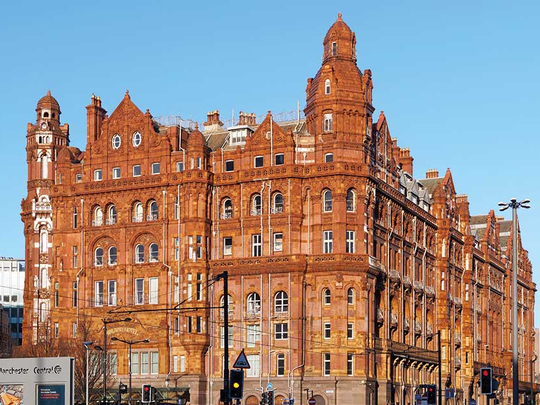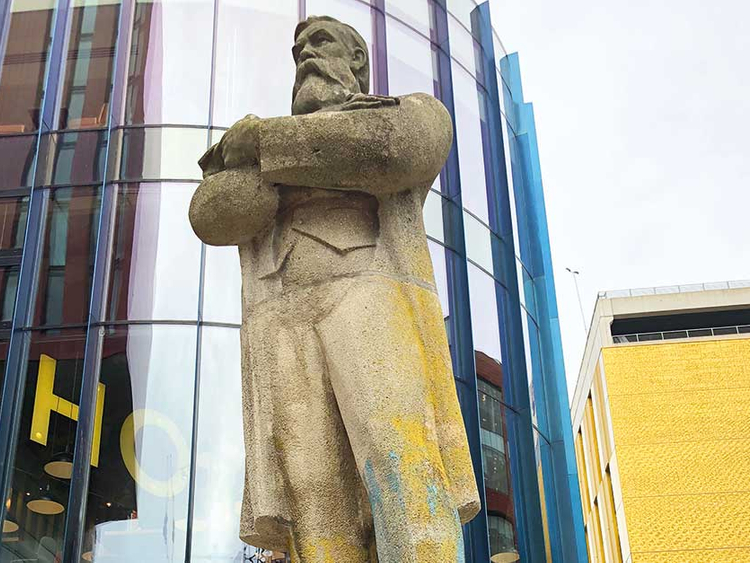
When Friedrich Engels saw first-hand the plight of the factory workers in 18th-century England — particularly in Manchester, which was the heart of the British rust belt, so to speak — it prompted him to sound a clarion call for the working class in the rest of the world, alerting them to the dangers of capitalist exploitation. Thus germinated the seeds of a timeless tome on class and class struggle in the form of The Communist Manifesto, for which Engels collaborated closely with German philosopher Karl Marx. That was 1848.
Manchester, the British industrial hotbed and the hub of cotton mills renowned the world over, was at the pinnacle of its glory in terms of what successful entrepreneurship and an extremely enterprising working class could achieve — not just industrial output, but also helping a capitalist order push through with its imperialist outreach and colonial ambition. The dangers of capitalist exploitation and the inhuman working conditions that prevailed in contemporary Manchester turned out to be the catalyst behind a revolution led and managed by the working class that was to take Russia by storm and spread its visionary fire to many other parts of the world, far and near, in due course.
Ironically, the flames of this revolution did not engulf England — unlike many countries in Eastern Europe and Asia. Yet, it was England, and specifically Manchester, that served up the ‘home truths’ that made philosophers such as Marx and Engels realise the need to stoke the flames of a working-class turnaround.
Given such a background, it is no wonder that a commercial centre called Home on Manchester’s First Street has a larger-than-life statue of Engels on its courtyard. It’s fascinating — a towering presence of a socialist visionary, who had propounded an end to a capitalist order through a working-class uprising, right in the heart of a city that has been built on the material and inspirational gains of a manufacturing superstore!
This contrast, this dichotomy is what sets Manchester apart. If you happen to visit the city, you are bound to be enamoured by this contrast that has been woven into the city’s DNA. The gothic architecture of the Victorian and Elizabethan-era buildings is a polar opposite to the many futuristic structures in glass-and-steel cladding that adorn the city — reinstating a commitment to historicity that is closely matched by a post-modern urge to excel in idea and design.
From the extremely contemporary Beetham Tower and Innside Manchester hotel to the Victorian allure of St James’s Buildings; from the neo-Gothic structure of the Town Hall to the swanky precincts of the Central Library; from the ornate ceilings of John Rylands Library to the lush greenery of the Old Trafford Stadium, home to the Manchester United football club, Manchester grips you, mesmerises you with its veritable mix and freeze-frame interplay of the old and the new, the modern and the ancient.
And there’s history woven into every inch of those brick-and-mortar edifices. If a walk down any of the streets or open-access public spaces in London makes you feel that rush of adrenaline and cheerful din of a welcoming global village that’s steeped in a culture that’s all-pervading, then Manchester is that slow-fire earthen nook that enraptures you with its ever-growing warmth and promises you an ‘and-so-to-bed’ lullaby of time well-spent, far from the maddening crowds.
There’s history and culture in every nook and corner of this British city. Taking a quick detour from Home, as you step into the hustle-bustle of Peter Street, the monolithic presence of a popular Victorian edifice that goes by the name of Midland Hotel is bound to catch your attention. And the tour guide’s voluble commentary soon reveals the fascinating detail of this hotel being the venue where one Mr Charles Rolls and Mr Henry Royce had their first meeting in 1904. A meeting that would eventually result in the birth of an iconic dream machine — the first Rolls-Royce car. Decades later, the same Midland Hotel played host as a gorgeous couple stepped out of their limousines one evening for their first date. David Beckham and Victoria Caroline Adams’s candle-lit dinner would soon force British tabloids on to extra print runs, the paparazzi into a tizzy and the rumour mills on a never-ending grind!
Walk a few hundred metres down the road, take a quick turn on to Brasenose Street, and you will soon find yourself standing right in front of a life-size statue of former United States president Abraham Lincoln, gracing the Square named after him. The imposing structure of the Midland Hotel that you had seen barely a few minutes ago is gone as Lincoln Square’s business centres and eateries charm you with their contemporary look and feel.
Keep walking past those red-and-black rent-a-ride bicycles. As a melon-yellow tram whizzes by, packed with the evening rush-hour crowd, you are suddenly reminded of those merry men and women the night before, with a spring in their steps, as they strutted towards Manchester Arena for a rock concert.
On Nelson Street stands the famous Pankhurst Centre. Previously the home of Emmeline Pankhurst, on October 10, 1903, a group of women gathered there and decided that it was time, not for words but action — to claim voting rights. This urge for self-determination crystallised into the Suffragette Movement that finally saw women earn their right to vote — not only in England, but in many other nations around the world. Today, the Pankhurst Centre in Manchester serves as a museum that is a glowing tribute to a movement that helped the cause of gender equality perhaps like no other.
A tour of Manchester can never be complete without sampling the piping hot stuff at Mackie Mayor, on Eagle Street — a café, bistro, steakhouse all rolled into one. If you find the two-panelled solid-wood mahogany doorway rather intriguing and even a bit odd for a gateway to casual dining, then you are bound to be in for an even bigger surprise by the minimalist obsession that graces its interiors.
If you had plans for a quiet, romantic table for two, forget it, for this is one rambunctious eatery where solitude has been very definitively hurled out of the window and instead guests are more than welcome to stir up a storm over a piping hot bowl of lentil soup and crispy gingerbread or a steaming cup of Earl Grey in bone China with some sour dough pizza for company. Theatre, music, food, politics … the debates, the gossips, the news and the views keep rolling in and out in an endless stream-of-consciousness deluge and as the hint of the late-morning sun, from an otherwise grey Manchester sky, makes a desperate bid to slice its way through the glass-dome ceiling, you bet there simply couldn’t have been a better way to brighten up your day.
Step out of Mackie Mayor, thoroughly satiated by its soul-stirring cacophony of mood music, and head straight to Manchester Craft and Design Centre, just a few blocks away on Oak Street. If you are looking for a few mementos for loved ones back home, but simply grown tired of those hackneyed key chains and fridge magnets, then Manchester Craft and Design Centre is just your kind of place with its ensemble of contemporary visual art and craft that’s steeped in good taste and yet doesn’t burn a hole in your pocket.
Talking about contemporary art, the theatre circuit in Manchester is a must-do. Whether it is the showcasing of Mary Shelley’s Frankenstein at the Royal Exchange or Verdi’s classic Un ballo in Maschera at the opera in The Lowry, Manchester is in every sense a continuation, an extension of all that makes you fall in love with London’s West End. And as you head for the opera at The Lowry, the quaint waterway that goes by the name of The Quay and the Pier 8 restaurant on its banks make for a perfect setting for a pre-theatre meal.
From its pubs to the churches, from its streets to the quay, from its mills to the milling crowds, from Friedrich Engels to feminism … Manchester rises above the familiar din of a developed world to share its tale of a sombre passing by of time and memories that whet your appetite for wanderlust. Soak it up.













